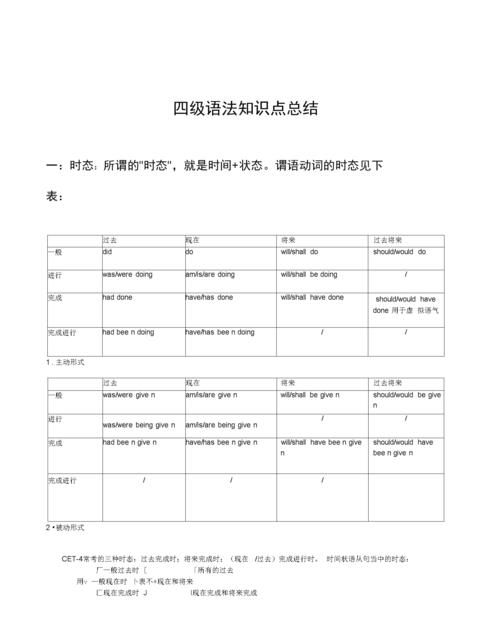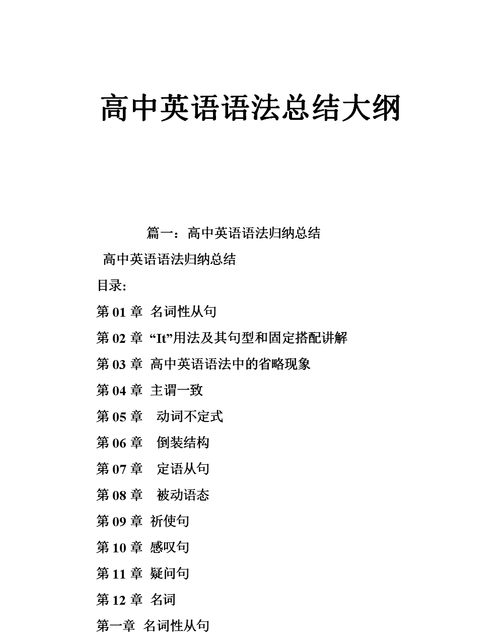本文目录
英语四级主要考察的知识点是什么
专业英语四级重要知识点
英语专业四级考试(TEM-4,Test for English Majors-Band 4),全称为全国高校英语专业四级考试。自1991年起由中国大陆教育部实行,考察全国综合性大学英语专业学生。下面是我为大家带来的专业英语四级重要知识点,欢迎阅读。

一、语法部分考查重点
1、虚拟语气的考点为:
would rather+that从句+一般过去时;
It is vital/ necessary/ important/ urgent/ imperative/ desirable/ advisable/ natural/ essential+that+(should)动词原形;
proposal/suggestion+that+动词原形;
It is time/about time/high time+that+一般过去时;
lest+that+should+动词原形;
if only+that+would+动词原形。
2、状语从句的考点为:
非if引导的条件状语从句,此类句子多用at times,provided,so long as,in case,once等来替代if;
由even if/so,now that,for all等引导的让步状语从句;
just/hardly...when引导的时间状语从句;more than,as...as,not so much as,the same as,as much as等引导的比较状语从句。
3、独立主格结构多以逻辑主语+分词的形式出现。
4、情态动词多与完成时形式连用。
5、定语从句重点考查介词+关系代词(which)和as作为关系代词。
二、词汇部分考查重点
1、动词、名词与介词的搭配如:popular/patient+with;yield/solution/adapt/transfer/access+to;accuse/require+of;charge+for;under+discussion等等。
2、习惯用法如:confess to/set about/be used to+doing;be supposed to/have/make sb.+do等。
3、由同一动词构成的短语如:come,go,set,break等构成的短语。
4、单个的动词,抽象名词,形容词和副词多以近义词、同义词的形式出现。
5、介词短语在句中作状语如:in terms of;with the exception of;in vain等,另外还应注意rather than,other than,such as,none/nothing+but等词在考题中的出现。
三、专四重要词组
1.abide by(=be faithful to ; obey)忠于;遵守。
2. be absent from…. 缺席,不在
3. absence of mind(=being absent-minded) 心不在焉
4. absorb(=take up the attention of)吸引…的注意力(被动语态)be absorbed i n 全神贯注于…近be engrossed in ; be lost in ; be rapt in ;be concentrated on ; be focused on ; be centered on
5. (be) abundant in(be rich in; be well supplied with) 富于,富有 6. access(to) (不可数名词) 能接近,进入,了解
7. by accident(=by chance, accidentally)偶然地,意外. Without accident(=safely) 安全地,
8. of one’s own accord(=without being asked; willingly; freely)自愿地 ,主 动地
9. in accord with 与…一致 . out of one’s accord with 同….不一致
10. with one accord (=with everybody agreeing)一致地
11. in accordance with (=in agreement with) 依照,根据
12. on one’s own account 1) 为了某人的缘故, 为了某人自己的利益 2) (=at one’s own risk) 自行负责 3) (=by oneself)依靠自己 on account 赊账; on account of 因为; on no account不论什么原因也不;of …account 有…..重要性.
13. take…into account(=consider)把...考虑进去
14. give sb. an account of 说明, 解释 (理由)
15. account for (=give an explanation or reason for) 解释, 说明.
16. on account of (=because of) 由于,因为.
17. on no account(=in no case, for no reason)绝不要,无论如何不要(放句首时句 子要倒装)
18. accuse…of…(=charge…with; blame sb. for sth. ; blame sth. on sb. ; complain about) 指控,控告
19. be accustomed to (=be in the habit of, be used to)习惯于.
20. be acquainted with(=to have knowledge of) 了解; (=to have met socially ) 熟悉
21. act on 奉行,按照…行动; act as 扮演; act for 代理
22. adapt oneself to(=adjust oneself to) 使自己适应于
23. adapt…(for) (=make sth. Suitable for a new need) 改编, 改写(以适应新的需要)
24. in addition (=besides) 此外, 又, 加之
25. in addition to(=as well as, besides, other than)除…外
26. adhere to (=abide by, conform to, comply with, cling to, insist on, pe rsist in, observe, opinion, belief ) 粘附; 坚持, 遵循
27. adjacent(=next to, close to) 毗邻的, 临近的
28. adjust..(to) (=change slightly)调节; 适应;
29. admit of (=be capable of, leave room for) …的可能,留有…的余地.
30. in advance (before in time) 预告, 事先.
31. to advantage 有利的,使优点更加突出地.
32. have an advantage over 胜过. have the advantage of 由于…处于有利条件 have the advantage of sb.知道某人所不知道的事
33. take advantage of (=make the best of, utilize, make use of, profit from, harness)利用.
34. agree with 赞同(某人意见) agree to 同意
35. in agreement (with) 同意, 一致
36. ahead of 在…之前, 超过…;……………. ahead of time 提前.
37. in the air 1)不肯定, 不具体. 2)在谣传中.
38. above all (=especially, most important of all) 尤其是, 最重要的.
39. in all (=counting everyone or everything, altogether) 总共, 总计
40. after all 毕竟,到底; (not) at all 一点也不; all at once(=suddenly)突然; once and for all 只此一次; above all 最重要的; first of all 首先; all in all 大体上说; be all in 累极了; all but 几乎.
41. allow for (=take into consideration, take into account) 考虑到, 估计到 .
42. amount to (=to be equal to) 总计, 等于.
43. answer for (undertake responsibility for, be liable for, take charge for) 对…负责.
44. answer to (=conform to) 适合,符合.
45. be anxious about 为…焦急不安; 或anxious for
46. apologize to sb. for sth. 为…向…道歉
47. appeal to sb. for sth. 为某事向某人呼吁. appeal to sb. 对某人有吸引力
48. apply to sb. for sth. 为…向…申请 ; apply for申请; apply to 适用.
49. apply to 与…有关;适用
50. approve of (=consent to, be in favor of, favor, agree to, consider good, right) 赞成, approve vt. 批准
51. arise from(=be caused by) 由…引起.
52. arrange for sb.sth. to do sth. 安排…做…
53. arrive on 到达; arrive at 到达某地(小地方);得出,作出; arrive in 到达某地(大地方);
54. be ashamed of (=feel shame, guilt or sorrow because of sth. done) 以… 为羞耻
55. assure sb. of sth. (=try to cause to believe or trust in sth.) 向…保证, 使…确信.
56. attach(to) (=to fix, fasten; join) 缚, 系 ,结
57. make an attempt at doing sth. (to do sth.) 试图做…
58. attend to (=give one’s attention, care and thought)注意,照顾;attend on(upon)(=wait upon, serve, look after) 侍候,照料
59. attitude to toward …对…的态度.看法
60. attribute…to…(=to believe sth. to be the result of…)把..归因于.., 认为..是..的结果
61. on the average (=on average, on an average) 平均
62. (be) aware of (=be conscious of , having knowledge or consciousness)意识到,知道.
63. at the back of (=behind) 在…后面
64. in the back of 在…后部(里面); on the back of 在…后部(外面); be on one’s back(=be ill in bed) 卧病不起.
65. at one’s back(=supporting or favoring sb.) 支持,维护; have sb. at one ’s back 有…支持, 有…作后台
66. turn one’s back on sb. (=turn away from sb. in an impolite way) 不理睬(某人),背弃,抛弃
67. behind one’s back 背着某人(说坏话)
68. be based on upon 基于
69. on the basis of 根据…, 在…基础上
70. beat…at 在…运动项目上打赢
71. begin with 以…开始. to begin with (=first of all) 首先, 第一(经常用于开始语)
72. on behalf of (=as the representative of) 以…名义
73. believe in(=have faith or trust in; consider sth.sb. to be true) 相信,依赖,信仰.
74. benefit (from) 受益,得到好处.
75. for the benefit of 为了…的利益(好处)
76. for the better 好转
77. get the better of (=defeat sb.) 打败, 胜过.
78. by birth 在出生上,论出身,按血统 at birth 在出生时; give birth to 出生
79. blame sb. for sth. 因…责备某人 . blame sth. on sb. 把…推在某人身上
80. in blossom开花(指树木) be in blossom开花(强调状态) come into blossom开花(强调动作)
81. on board 到船上, 在船上, 上火车或飞机
82. boast of (or about) 吹嘘
83. out of breath 喘不过气来
84. in brief(=in as few words as possible)简言之
85. in bulk 成批地,不散装的
86. take the floor 起立发言
87. on business 出差办事.
88. be busy with sth.于某事 。 be busy doing sth. 忙于做某事
89. last but one 倒数第二.
90. but for (=without) 要不是. 表示假设
91. buy sth. for…money 用多少钱买
92. be capable of 能够, 有能力 be capable of being +过去分词是能够被…的
93. in any case(=for love or money, at any rate, at any price, at any cost , whatever happens; anyhow)无论如何
94. in case (=for fear that) 万一;
95. in case of (=in the event of)如果发生…万一 in the case of 至于…, 就…而言
96. in no case在任何情况下都不(放句首倒装句)
97. be cautious of 谨防
98. center one’s attention on(=focus one’s attention on) 把某人的'注意力集中在…上
99. be certain of (=be sure of) 有把握, 一定.
100. for certain of (=for sure )肯定地,有把握地
101. by chance(=accidentally, by accident)偶然
102. for a change换换环境(花样等)
103. charge sb. with …控告某人犯有…
104. in charge of (=responsible for) 负责(某事) in the charge of …由…管
105. take charge of (=to be or become responsible for)负责管理(照顾)
106. charge…for 因…索取(费用) , charge sb. with sth. 控告某人犯有…
107. round the clock(=all day and all night, usually without stopping) 昼夜不停地
108. comment on 评论
109. commit oneself to 使自己承担… commit sb. to prison把某人送进监狱; commit one’s idea to writing 把某人的想法写下来; commit a matter to a committee 把某事交给委员会讨论
110. in common (和…)有共同之处,共用. be common to sb. 是与某人所共有的
111. keep company with (=be friendly and go out together) 和…要好.
112. compare…with … 把…与…比较
113. compare…to… 把…比作…
114. by comparison 比较起来
115. in comparison with (=in contrast to) 和…比起来
116. compensate for (=give sth. to make up for) 补偿, 赔偿,弥补 compensate sb. for sth. 赔偿,弥补
117. complain of (or about)抱怨;诉苦;控告;complain about 抱怨某人或事情; complain to sb. about sth. (or sb.) 向某人抱怨…; complain (抱怨); complement (补充); compliment (恭维)
118. comply with (=act in accordance with a demand, order, rule etc.) 遵守, 依从
119. conceive of (think of, imagine, consider) 想象,设想
120. concentrate on (or upon) 集中,专心
121. be concerned with (=about) 与…有关
122. concern oneself about with 关心
123. in conclusion(=as the last thing)最后一点; at the conclusion of 当…结束时;
124. condemn sb. to 判决
125. on condition that (=if)以…为条件, 假如. in that = because因为; now that = since既然 for all that = although 尽管
126. in out of condition (=thoroughly healthy or fit not fit) 健康状况好不好 . in good (bad) condition处于良好(坏)状态
127. confess(to)(=admit a fault, crime, or sth. wrong)承认, 供认; confess to a crime 承认罪行.
128. confide in (=to talk freely to sb. about one’s secret) 对…讲真心话, 依赖
129. in confidence 推心置腹地; with confidence 满怀信心地; have confidence in 对…有信心
130. confidence in sb. sth. 对…的信赖
131. be confident of 有信心; confidential 机密的
132. confine…to… 把…限制在某范围内
133. confirm sb. in 使某人更坚定(信念等)
134. conform to (=be in agreement with, comply with) 符合,遵照,遵守;1)obey 服从; 2) observe; 3)comply with照…办; 4)keep to遵循; 5)abide by服从;6)stick to按..做
135. be confronted with(=be brought face to face with) 面对, 面临
136. congratulate sb. on 祝贺
137. in connection with(=with regard to)关于,
138. be conscious of(=be aware of)觉察,知道
139. consent to(=give agreement to permission)同意
140. in consequence (=as a result) 结果
141. in consequence of (=as a consequence of)由于…的结果
142. under consideration 在考虑中
143. in consideration of (=in return for, on account of, because of )由于
144. on no consideration(in no case)无论如何也不
145.take…into consideration (=take account of, take…into account)考虑到, 把 …考虑进去
146. considerate (=thoughtful of the needs) 体贴的, 考虑他人需要的, considerable相当大的,值得考虑的
147. consist of(=be composed of)由…组成的. consist in主要在于. consist with符合,与…一致
148. be consistent with(=be in agreement with)与…一致. be consistent in一贯的 ,
;四级英语语法归纳总结
买本语法书,好好看一下吧
四级的语法基本包括了你初高中所学的全部语法了
也可以把之前笔记拿出来好好看看了,只要你能理解了,语法就掌握的差不多了!记住是理解!

全国公共英语四级考试知识点总结大全
2017年全国公共英语四级考试知识点总结
全国英语等级考试(Public English Test System,简称PETS),是教育部考试中心设计并负责的全国性英语水平考试体系。作为中、英两国政府的教育交流合作项目,在设计过程中它得到了英国专家的技术支持。 级别划分为PETS-1至5级。下面是我为大家带来的2017年全国公共英语四级考试知识点总结,欢迎阅读。

一、PETS四级考试的难度和潜在应试者
根据《全国公共英语等级考试第四级考试大纲》的描述,PETS
第四级是PETS考试五个级别中的中上级,相当于我国非英语专业本科大学毕业生的水平,比我国现行的大学英语四、六级考试的六级的难度略高。它的部分试题
难度就是我国现行的普通高等学校非英语专业硕士研究生入学英语考试的水平,不过研究生考试目前不考听力和口语。根据最初设计,PETS四级考试将替代研究
生入学的英语考试,至少该考试将依照PETS四级的模式进行改造。
TS四级考试和其他级别考试一样分笔试和口试两部分。笔试部分有四种题型,即听力、英语知识运用、阅读理解和写作;口试部分分为三节。下面对这些题型分别介绍——
1、听力:
考虑到了考生以后的学习和工作中对英语的应用,本级要求考生能够听懂英文讲座、学术发言或论证的内容。试题所选材料也大部分来自于现实生活的真实情景,以便使考生通过复习考试培养听懂这些语言材料的能力。在试题形式上看,分A、B、C三节,共占考试总分的30%。A节和B节试题形式在现行的听力考试中是比较新的,它们不仅考查考生理解信息的能力,而且考查他们用听到的信息去完成一定任务的能力。A节要求考生听到对话或独白后填补句子和表格中的空白;B节
要求考生根据听到的一段对话或独白回答5道简答题。这里的填空或简答类似与四、六级考试中的简答题,而四、六级考试中的简答题是通过阅读理解实现的。C节要考生听三段对话或独白,然后做选择题,这类题也就是通常考试中的听力理解题。
做哪一类听力试题,最重要的一条就是做题之前首先浏览试题。这样做不仅可以了解答题要求,还可以通过问题内的若干信息判断听力材料的话题范围,以便调动自己在该方面的知识积累,更迅速地作出判断。
2、语言知识运用:
该部分就是通常所说的完型填空题,共设20道选择题。它的分数占整个考试分数的10%,考查内容有词汇(12-15道小题)、语法和篇章结构(5-8道小题)。词汇题重点考查的.是在规范语言中词的搭配和用法,篇章结构考查句子层次以上语言成分的辨识和理解能力,这类题常考一些标志意义转折、顺承以及原因、结果、举例、顺序、总结等的副词和连词。由于PETS四级是中高级别的考试,所以它不把专门考查语法作为整个考试的一项,而是通过其他题型要求考生对基本语法结构达到运用自如。
3、阅读理解:
阅读理解也分为A、B两节。A节要求考生阅读4篇文章,然后做四选一的选择题。本节与研究生入学英语考试的阅读理解题从形式上看没有区别,但这里的阅读材料的现实性和专业性都更突出。从问题特点上看,考查文章主旨大意、作者观点、态度、进行引申、推理和判断的题以及利用上下文判断特定句子和词的意义的试题占绝大部分。B节为翻译题,和研究生入学英语考试的翻译题一样,这里也要求考生先阅读一
篇文章,然后将文章内的一些句子译为汉语,本节兼考翻译能力和理解的准确性。
PETS四级写作题与研究生入学考试的作文是一个模式。该部分要求考生根据提示信息(中文/英文)写出一篇160-200词(标点符号不计算在内)的短文。提示的信息有主题句、写作提纲、规定情景、图表等。此类作文一般是引出一个话题让应试者谈自己的看法。对于规定情景题、图表题,考生应知道将试题提供的信息作为表达自己观点的材料,用一到两句话引出话题然后直接提出自己的观点(全文的主题句),再分一到三个段落来论证自己的观点。每一段的起始部分应先
写出该段的主要意思(段主题句),最好用上能标志层次与顺序的副词,最后可以重申主题句来作出结论。需要注意的是由于文章有字数限制,每一段都应做到简洁。
5、口试:
和其他级别的口试一样,PETS四级的口试试题也分为A、B、C三节。A节为口试教师和考生的交流,这里由两个口试教师中的一个分别向两个考生就考生个人情况,家庭、工作、学习等方面提问;B节为两个考生之间的交流,这里要求两个考生对提供的图片交换信息和看法,也就是开展对话;C节要求考生就某一问题(提供图片等信息),陈述自己的观点并加以论证,然后由另一考生根据他的陈述提问,事实上这就是论文答辩,这也是硕士研究生上课的主要方式。
三、复习资料的准备
最近有部分读者来信反映说他们很想参加全国公共英语等级考试,需要一些必备的复习资料,希望我们推荐复习教材。对此我可以就我所了解的情况简单介绍一下。公共英语等级考试为水平考试不指定专门教材,凡是与某一级试题水平相当的教材都可以使用。教育部考试中心编写的各级考试大纲是考试的重要复习依据。
;英语四级必备语法知识
英语四级语法知识:不定冠词的用法
冠词是虚词,本身不能单独使用,也没有词义,它用在名词的前面,帮助指明名词的含义。英语中的冠词有三种,一种是定冠词(the Definite Article),另一种是不定冠词(the Indefinite Article),还有一种是零冠词(Zero Article)。
不定冠词a (an)与数词one 同源,是"一个"的意思。a用于辅音音素前,一般读作[e],而an则用于元音音素前,一般读做[en]。
1) 表示"一个",意为one;指某人或某物,意为a certain。
A Mr. Ling is waiting for you.
2) 代表一类人或物。
A knife is a tool for cutting with.
Mr. Smith is an engineer.
3) 词组或成语。
a little / a few / a lot / a type of / a pile / a great many / many a / as a rule / in a hurry / in a minute / in a word / in a short while / after a while / have a cold / have a try / keep an eye on / all of a sudden
英语四级语法知识:定冠词的用法
定冠词the与指示代词this,that同源,有"那(这)个"的意思,但较弱,可以和一个名词连用,来表示某个或某些特定的人或东西。
1)特指双方都明白的人或物:
Take the medicine. 把药吃了。
2)上文提到过的人或事:
He bought a house. I've been to the house.
他买了幢房子。我去过那幢房子。
3)指世上独一物二的事物:
the sun, the sky, the moon, the earth
4)单数名词连用表示一类事物,如:the dollar 美元;
the fox 狐狸;或与形容词或分词连用,表示一类人:the rich 富人; the living 生者。
5)用在序数词和形容词最高级,及形容词only, very, same等前面:
Where do you live? I live on the second floor. 你住在哪?我住在二层。
That's the very thing I've been looking for. 那正是我要找的东西。
6)与复数名词连用,指整个群体:
They are the teachers of this school.指全体教师)
They are teachers of this school. (指部分教师)
7)表示所有,相当于物主代词,用在表示身体部位的名词前:
She caught me by the arm.. 她抓住了我的手臂。
8)用在某些由普通名词构成的国家名称、机关团体、阶级、等专有名词前:
the People's Republic of China 中华人民共和国
the United States 美国
9)用在表示乐器的名词之前: She plays the piano. 她会弹钢琴。
10) 用在姓氏的复数名词之前,表示一家人:
the Greens 格林一家人 (或格林夫妇)
11) 用在惯用语中:
in the day, in the morning (afternoon,evening), the day after tomorrow
the day before yesterday, the next morning,
in the sky (water,field,country)
in the dark, in the rain, in the distance,
in the middle (of), in the end,
on the whole, by the way, go to the theatre
英语四级复习资料:语法知识小编就说到这里了,更多关于大学英语四级的备考技巧,备考干货,新闻资讯,报名入口等内容,小编会持续更新。祝愿各位考生都能认真备考,取得满意的成绩。

以上就是关于英语四级语法知识点大纲,英语四级主要考察的知识点是什么的全部内容,以及英语四级语法知识点大纲 的相关内容,希望能够帮到您。
